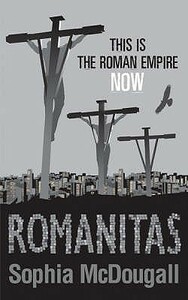Take a photo of a barcode or cover
Sadly the author didn't make the most of its own alternate history setting. Or at least that's what it felt like to me. The only plot point where the modern day Roman Empire concept was the one involving slavery. On the plus side, the characters were interesting enough and the plot moves along nicely. Haven't quite decided yet if I'm going to go on to read the second instalment in the series.
The first of a projected trilogy, Romanitas is an interesting novel, even if it's one that I don't think entirely works. Set in a world where the Roman Empire fell, where Christianity never took hold, slavery is still legal, and where the pax romanum holds sway from America to China, the possibilities are definitely intriguing. McDougall's prose is clear, and often inventive and striking without being purple. (Mostly: there are a couple of metaphors and similes which could have used an editor's touch) Some of her characters fall a little flat, and some of her relationships are a little too by-numbers, particularly the main romantic relationship. Most of them, however, are drawn quite realistically, and she resists the temptation to make them too nice or good in the pursuit of making them sympathetic.
The main place in which the book falls down, though, is the same thing which made me pick it up in the first place. Her extrapolation of the Roman empire forward into the 21st century simply didn't work for me. Perhaps it's merely because I've spent three years studying the empire in college, and a lifetime before that reading about it, but it was very obvious to me that she wasn't a classicist by training. There was no depth to her imagining of a greater Roman empire, no colour to it. For all the visual nature of her writing, there is no clear picture of what the empire has become, what it is; and in a work which hinges around the fact that this is the Roman empire, now, that is a very great failing indeed. The book is called Romanitas, and yet I got very little sense of what that means from the book.
Lastly, on a purely historical level: the empire survived because of Pertinax? Are you kidding?
The main place in which the book falls down, though, is the same thing which made me pick it up in the first place. Her extrapolation of the Roman empire forward into the 21st century simply didn't work for me. Perhaps it's merely because I've spent three years studying the empire in college, and a lifetime before that reading about it, but it was very obvious to me that she wasn't a classicist by training. There was no depth to her imagining of a greater Roman empire, no colour to it. For all the visual nature of her writing, there is no clear picture of what the empire has become, what it is; and in a work which hinges around the fact that this is the Roman empire, now, that is a very great failing indeed. The book is called Romanitas, and yet I got very little sense of what that means from the book.
Lastly, on a purely historical level: the empire survived because of Pertinax? Are you kidding?
An engaging read, the main characters are well drawn, flawed and vulnerable. Wasn't so sure about the Emperor - as ruler of a vast empire he seemed rather ineffectual. Perhaps underlings did everything for him?
adventurous
tense
medium-paced
Plot or Character Driven:
Plot
Strong character development:
No
Loveable characters:
No
Diverse cast of characters:
No
Flaws of characters a main focus:
No
Eh, it's at best fine. Maybe good for a younger teen obsessed with the Roman empire. Some hiking in rough conditions and varying degrees of peril.
The book is set in the equivalent of 2005, with technology having progressed in some ways as it has in our world, but with none of the associated social change. The empire runs on slavery, sexism is rampant, the emperor's rule is absolute, and death by crucifixion is common.
Some people have powers. This is never explored or explained. The kid with miraculous healing powers is left in the control of one ageing doctor running a single clinic. The kid with mental powers is generally believed without much fuss.
The book also suffers from norms having changed since it was published. Every skin tone mentioned is pale, every attraction straight, and one of the few genuinely dangerous people was left disabled by his time on a cross.
The book is set in the equivalent of 2005, with technology having progressed in some ways as it has in our world, but with none of the associated social change. The empire runs on slavery, sexism is rampant, the emperor's rule is absolute, and death by crucifixion is common.
Some people have powers. This is never explored or explained. The kid with miraculous healing powers is left in the control of one ageing doctor running a single clinic. The kid with mental powers is generally believed without much fuss.
The book also suffers from norms having changed since it was published. Every skin tone mentioned is pale, every attraction straight, and one of the few genuinely dangerous people was left disabled by his time on a cross.
After reading [The Dragon Waiting](https://books.rixx.de/john-m-ford/the-dragon-waiting/), I wanted more Alternate History, and *Romanitas* seemed like an obvious choice. It's, to say it with the [recommendation](https://www.reddit.com/r/Fantasy/comments/h877m0/fantasy_world_based_on_classical_antiquity/fus3igx/), Fatherland but with Rome. In a world with current-time tech, the Roman Empire has never fallen, it never even moved to Byzantium. All of society is just as in the Rome of Tiberius, only with tech. So we have no emancipation, an Imperial family with an Emperor choosing his successor, and of course: slavery and crucifiction, with high-tech iron crosses along major roads.
Marcus Protagonistus (he has a real name, but he also has a bad case of protagonist syndrome) is the nephew of the Emperor and is father is heir to the throne until he is murdered, with his wife, just before the beginning of the book. Drink one for orphaned protagonist. It turns out that his death was *not* a car accident – strong "You are a wizard, Marcus" vibes – and he was probably murdered because he wanted to abolish slavery, by people who rely on slaves and don't want Rome to fall. Marcus has to flee and is mildly determined to also abolish slavery.
Guess who the good guys are.
Sorry. Snarky day. The plot continues as you'd guess: He meets the other POV characters, who are escaped slaves with slightly supernatural capabilities – the strong wild girl and the sensitive boy –, token character development happens, the protagonist is sent up the tree of compilcations, pelted with the rocks of despair and conveniently set-up family intrigue, and finally permitted down in imperial success, with plenty of hints that are meant to draw you into the next book.
I'm hard on this book because it lost me very early on – not as much my suspension of disbelief but my entire immersion was gone once it got clear that little thought had gone into the practicalities of this world. There's an appendix with a rough timeline for this empire, but all the juicy (and unlikely) bits are left out. It claims that for a thousand years, succession-by-appointment has not been a problem, for example! The story hinges on the fact that the protagonist, who is part of the imperial family and second-in-line for the throne, is absolutely astonished to find intrigue and assassination attempts, and is in no way prepared for it. The tech level seems to have just … spawned? We see television and security cameras in places, but no very hard propaganda or surveillance. Either no computers at all or completely under-utilised ones. The bit of deeper worldbuilding we get is "Rome wants war because they're running low on slaves".
The characters have their one, maybe two, adjectives and stay flat, too. What really shone in places, though, was the writing. McDougall manages to conjure up atmosphere very well, and the actual interactions between people often felt raw and real and deeply uncomfortable. It's what kept me going despite my lack of immersion.
Marcus Protagonistus (he has a real name, but he also has a bad case of protagonist syndrome) is the nephew of the Emperor and is father is heir to the throne until he is murdered, with his wife, just before the beginning of the book. Drink one for orphaned protagonist. It turns out that his death was *not* a car accident – strong "You are a wizard, Marcus" vibes – and he was probably murdered because he wanted to abolish slavery, by people who rely on slaves and don't want Rome to fall. Marcus has to flee and is mildly determined to also abolish slavery.
Guess who the good guys are.
Sorry. Snarky day. The plot continues as you'd guess: He meets the other POV characters, who are escaped slaves with slightly supernatural capabilities – the strong wild girl and the sensitive boy –, token character development happens, the protagonist is sent up the tree of compilcations, pelted with the rocks of despair and conveniently set-up family intrigue, and finally permitted down in imperial success, with plenty of hints that are meant to draw you into the next book.
I'm hard on this book because it lost me very early on – not as much my suspension of disbelief but my entire immersion was gone once it got clear that little thought had gone into the practicalities of this world. There's an appendix with a rough timeline for this empire, but all the juicy (and unlikely) bits are left out. It claims that for a thousand years, succession-by-appointment has not been a problem, for example! The story hinges on the fact that the protagonist, who is part of the imperial family and second-in-line for the throne, is absolutely astonished to find intrigue and assassination attempts, and is in no way prepared for it. The tech level seems to have just … spawned? We see television and security cameras in places, but no very hard propaganda or surveillance. Either no computers at all or completely under-utilised ones. The bit of deeper worldbuilding we get is "Rome wants war because they're running low on slaves".
The characters have their one, maybe two, adjectives and stay flat, too. What really shone in places, though, was the writing. McDougall manages to conjure up atmosphere very well, and the actual interactions between people often felt raw and real and deeply uncomfortable. It's what kept me going despite my lack of immersion.
I bought this book because reading the back of it made it seem really interesting. The Roman Empire is still around in the 21st century, still has all the things we associate with the Roman Empire like the Emperor,slavery and crucifiction but also with 21st century technology. In theory it sounds like the basis for a really good story but I didn't think it worked very well.The characters are unlikeable and I really didn't care if they lived or died. This is the first in a trilogy and I certainly won't be looking for the next two parts.
The only reason that I kept on reading it is because I hate to leave a book unfinished,in total this book took me about a month to read as I kept putting it down and reading other books instead. I am hoping that one day I'll be able to give up on a book that is really bad.
The only reason that I kept on reading it is because I hate to leave a book unfinished,in total this book took me about a month to read as I kept putting it down and reading other books instead. I am hoping that one day I'll be able to give up on a book that is really bad.
Too long and too dense with world-building. I just wasn't feeling it from the opening pages.
This is the first fiction I have read in aaaaages. I liked it because there was much chasing around and adventures, and no hard-to-follow political intrigue as I had thought at first.
The Roman feel was subtle enough, as the world mostly looks like the one we have today: for example, most real world inventions seem to exist in the fictive world as well, sometimes with latinised names (such as telephone becoming longdictor). While I felt at first that the effect was too subtle, I ended up really appreciating the fact that it didn't feel like reading a story set around 50BC (or 703 AUC) but with people having guns and telephones. The part of the Roman feel that wasn't subtle, being the point of the plot I suppose, was that slavery is still a banal and common thing in the novel.
Finally I liked that the text wasn't structured as "odd chapters for character X, even chapters for character Y" (I'm not sure how to describe it), a format tends to tire me a bit. And I liked that, despite being Part 1 in a trilogy, the novel didn't end up in a bunch of gripping cliffhangers, as most of everything was solved.
The Roman feel was subtle enough, as the world mostly looks like the one we have today: for example, most real world inventions seem to exist in the fictive world as well, sometimes with latinised names (such as telephone becoming longdictor). While I felt at first that the effect was too subtle, I ended up really appreciating the fact that it didn't feel like reading a story set around 50BC (or 703 AUC) but with people having guns and telephones. The part of the Roman feel that wasn't subtle, being the point of the plot I suppose, was that slavery is still a banal and common thing in the novel.
Finally I liked that the text wasn't structured as "odd chapters for character X, even chapters for character Y" (I'm not sure how to describe it), a format tends to tire me a bit. And I liked that, despite being Part 1 in a trilogy, the novel didn't end up in a bunch of gripping cliffhangers, as most of everything was solved.
adventurous
challenging
dark
informative
inspiring
tense
medium-paced
Plot or Character Driven:
A mix
Strong character development:
Yes
Loveable characters:
Complicated
Diverse cast of characters:
Yes
Flaws of characters a main focus:
Complicated
"Missed opportunity" are the two words that come to mind with this book. The novel's central idea is inherently intriguing - the Roman Empire never ended - but alas, the author does little with it. And it lacks plausibility. The Rome of this book has never evolved socially, even if it has taken a few extra steps technologically. It's still the same SPQR, warts and slaves and all. The other negative with this story is the low-key characters. They're a gaggle of quietly-spoken mumblers in a tale that cries out for decisiveness and cogent action. They're interesting, make no mistake, but there needed to be a lot more beefiness here.
A chance to do something amazing with this captivating setting has fled the coop. It went astray.
A chance to do something amazing with this captivating setting has fled the coop. It went astray.









